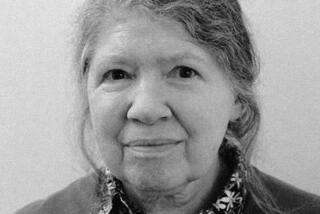Book Review : A Quartet of Close Encounters of the Very Strangest Kind
- Share via
The End of Tragedy by Rachel Ingalls (Simon & Schuster: $16.95; 185 pages)
This quartet of stories carries on in the mode set by Rachel Ingalls’ recent novel, “Binstead’s Safari.” In that unnerving but fascinating book, a browbeaten faculty wife is literally transfigured by her African experience. Here again, ordinary people suddenly find themselves in bizarre situations quite beyond their control.
Take Jim and Lisa, a young couple invited to a dinner party in the country. They set off with directions and the standard bottle of wine, and after a few wrong turns, they find the house and join the other guests. They don’t know anyone, but that sort of thing often happens when couples have different sets of friends left over from prior relationships. Jim and Lisa make strenuous efforts to be agreeable. They accept the oddly flavored house cocktail, chat politely to the people seated on either side, and conceal their qualms with admirable aplomb, struggling with the vile food, the undrinkable wine and the increasingly disconcerting conversation.
Eventually, Jim and Lisa realize that everyone there is a client of the host and hostess. He’s a healer, she’s a medium. Having no need of such attention, sensible Lisa would prefer to leave at once, but the fog has blanked out the countryside and they’re coerced into staying the night.
Struggling Actress
Jim is curiously acquiescent and Lisa’s pleas go unheeded. By the time she finally prevails and persuades Jim to attempt an escape, their fundamental incompatibility no longer matters a bit.
The title story concerns a struggling actress with only one remarkable talent. Auditioning for a bit part in a murder mystery, she discovers she can produce the most bloodcurdling scream the producers have ever heard. She’s hired on the spot, and the quality of her life improves exponentially. Unfortunately, success feeds ambition, and instead of happily screaming her way to fame and fortune, Mamie yearns for the chance to act in more challenging roles.
When an attractive young man offers her an opportunity to test her abilities with a spot of impersonation, she takes the job despite certain misgivings. Like Lisa in “Friends in the Country,” she permits reason to override intuition, a mistake Ingalls’ heroines often make. More contrived than the other stories, “The End of Tragedy” ends on a jarringly explicit note that forces us to re-evaluate our opinion of the winsome Mamie.
The Neglected Wife
“In the Act” is subtler and more ambiguous. In this story a neglected wife attends adult education classes while her scientist husbands putters around in the attic on a secret project. When the classes end unexpectedly, Edgar is far more upset than Helen. Apparently he cannot concentrate on his experiments unless the house is completely empty. Understandably curious, Helen explores his workroom while he’s out and finds an almost completed humanoid.
While Helen has been dabbling in the arts, Edgar has apparently been playing Dr. Frankenstein, though with some distinctly contemporary differences. Instead of a monster, Edgar has made a luscious and indefatigable sex partner for himself. Too respectful of her husband’s skill to destroy his masterpiece, Helen avenges herself far more effectively, with results that far exceed her original intention.
The fourth novella departs from this fanciful form to explore the entwined lives of two young Finns; an artist and an aesthete who meet in Paris. As realistic as the others are supernatural, “An Artist’s Life” shows a different facet of Ingalls’ talent. Serious where the others were droll, the story of Eino and Axel thoroughly examines the ways in which a seemingly casual encounter can determine destiny . . . a theme that lends itself to multiple variations.
More to Read
Sign up for our Book Club newsletter
Get the latest news, events and more from the Los Angeles Times Book Club, and help us get L.A. reading and talking.
You may occasionally receive promotional content from the Los Angeles Times.









